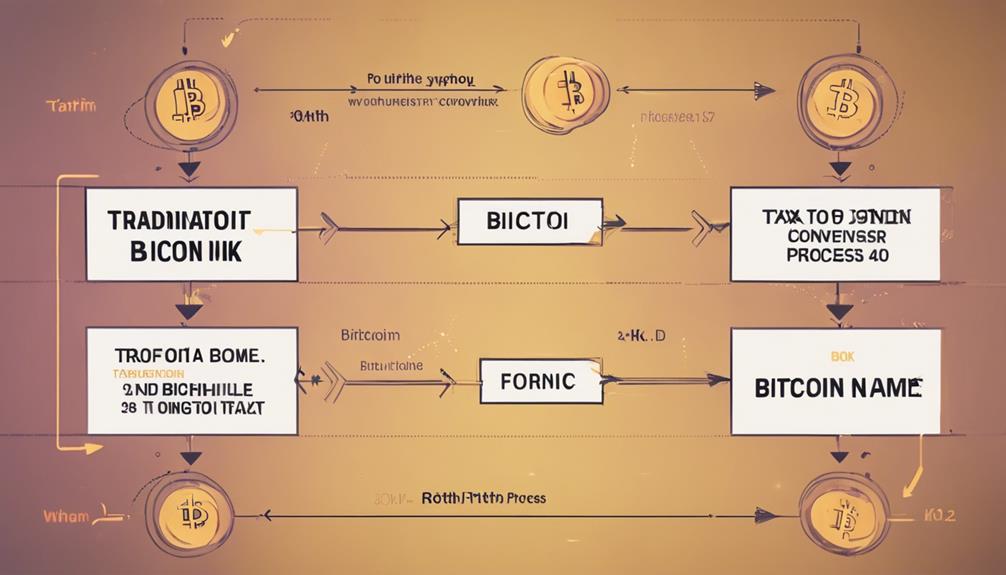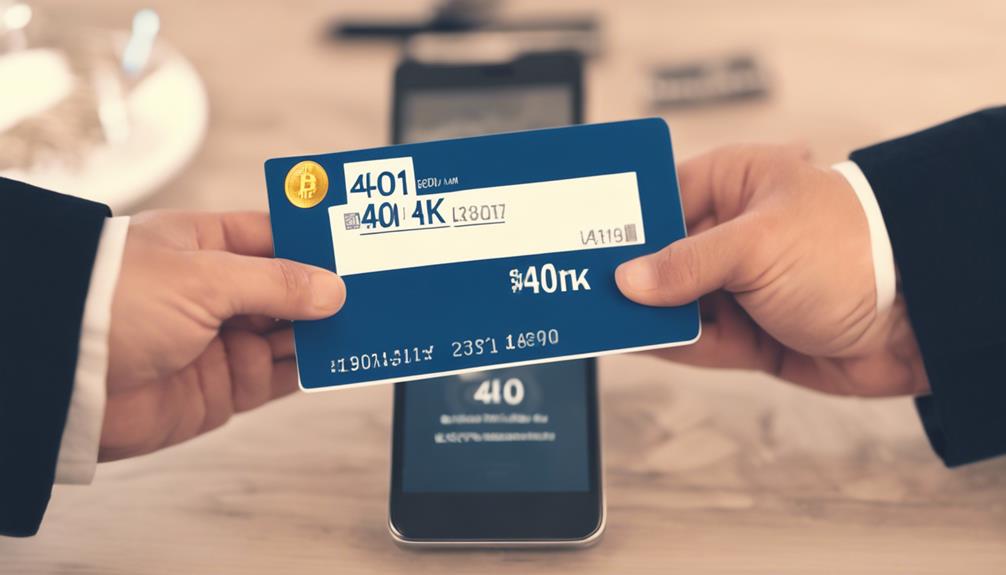To transfer your 401k into Bitcoin, it is important to first research reputable cryptocurrency IRA providers that prioritize security and offer a variety of options. You will need to decide between a Traditional (tax-deferred) or Roth IRA (tax-free withdrawals) based on your financial goals. Make sure to verify the details of your 401(k) and understand the tax implications involved. Seeking advice from a financial advisor can provide tailored guidance for this transition. Ensuring a smooth conversion to Bitcoin requires implementing strong security measures and effectively managing investment risks. Expert advice can help align your choices with your financial objectives and risk tolerance. Discover more about the process of protecting your retirement savings in cryptocurrency.
Key Takeaways
- Verify former 401(k) balance and eligibility.
- Select a reputable Bitcoin IRA provider.
- Initiate a direct rollover from 401(k) to Bitcoin IRA.
- Understand tax implications of the conversion.
- Seek guidance from a financial advisor for personalized advice.
Researching Reputable Crypto IRA Providers

Regularly monitoring the cryptocurrency market can help investors identify reputable Crypto IRA providers with a proven track record of security and compliance. When researching potential IRA providers, it is essential to prioritize security measures and regulatory compliance to safeguard your investments. A reliable provider should offer a diverse range of cryptocurrencies for investment, enabling you to create a well-rounded portfolio tailored to your financial goals.
In addition to security and compliance, it is important to take into account the fees and charges associated with the Crypto IRA provider. Transparent fee structures can help you assess the overall cost of maintaining your investment. Moreover, researching customer reviews and ratings can provide valuable insights into the provider's reputation and customer satisfaction levels.
Choosing Between Traditional or Roth IRA

When deciding between a Traditional or Roth IRA for converting a 401(k) to Bitcoin, it is important to carefully consider the tax implications and alignment with your financial objectives.
Traditional IRAs offer tax-deferred growth on investments, meaning you won't pay taxes on gains until withdrawal. In contrast, Roth IRAs provide tax-free withdrawals in retirement, allowing you to access your funds without incurring additional taxes.
Another key difference is that Traditional IRAs mandate minimum distributions starting at age 72, while Roth IRAs do not have this requirement, offering more flexibility in managing your retirement savings.
Additionally, Traditional IRAs may allow tax-deductible contributions based on income and participation in employer-sponsored plans, whereas Roth IRAs have income limits for eligibility.
When evaluating which option suits you best, consider your income level, retirement goals, and preferences regarding taxation.
Ultimately, the choice between a Traditional and Roth IRA will depend on your unique financial situation and objectives when converting your 401(k) to Bitcoin.
Confirming Former Employer 401(k)

To verify the status of your former employer's 401(k) account, meticulously review your account statements for verification before proceeding with any further steps. Confirm that the account is indeed from a previous employer by checking for past contributions that align with your employment history.
Confirm that you are no longer making contributions to this 401(k) from your former employer. It is essential to reach out to the administrator of your former employer's 401(k) plan to gather details on the account's current status.
During this communication, verify any vested contributions from your previous employer and inquire about your eligibility for different rollover options. Gather all necessary information, such as account numbers and contact details for the administrator, as you prepare to initiate the rollover process smoothly.
Being thorough in confirming these details will set a strong foundation for the subsequent steps in converting your 401(k) to Bitcoin.
Understanding Tax Treatment Variances

With differing tax treatments between Traditional and Roth IRAs in the conversion process of a 401(k) to Bitcoin, it is essential to carefully consider the implications on gains and tax obligations. Traditional IRA gains are taxed upon withdrawal, whereas Roth IRA gains are tax-free, making a significant difference in the tax treatment of your investments. Evaluating the immediate tax implications of each IRA type before converting your 401(k) to Bitcoin is vital to understanding how the choice may affect your overall tax situation. Additionally, it is important to assess the impact of capital gains taxes on profits from Bitcoin investments within different IRA accounts to make an informed decision. Consulting with a tax advisor can provide personalized insights into how converting your 401(k) to Bitcoin may influence your tax obligations, helping you navigate the process effectively.
| Aspect | Traditional IRA | Roth IRA |
|---|---|---|
| Tax Treatment | Taxed upon withdrawal | Tax-free |
| Tax Implications | Immediate tax implications | Tax-free gains |
| Capital Gains | Subject to capital gains tax | Tax-free gains |
Consulting With Financial Advisor

Engaging a qualified financial advisor can guide the process of converting a 401(k) to Bitcoin by providing tailored guidance aligned with individual financial objectives and risk tolerance. These advisors offer personalized advice on the tax implications of shifting retirement funds to Bitcoin, helping investors minimize tax liabilities. They assist in understanding the complexities of compliance with IRS regulations governing retirement account conversions.
Moreover, financial advisors can help in developing a thorough investment plan that reflects the investor's long-term objectives. Their expertise guarantees that the conversion aligns with the investor's goals and risk tolerance. By working with a financial advisor, individuals can gain peace of mind and benefit from expert advice throughout the entire process of converting a 401(k) to Bitcoin.
It is essential to seek professional guidance to make informed decisions regarding the conversion of retirement funds into cryptocurrency.
Initiating Rollover Process

When initiating the rollover process, it is vital to gather all necessary paperwork, including forms provided by your 401(k) administrator. Contacting your 401(k) administrator is the first step to inquire about the process and guarantee a smooth handover.
Reviewing your rollover options carefully will help you make informed decisions regarding transferring your retirement funds into a self-directed IRA for investing in Bitcoin.
Gather Rollover Paperwork
To initiate the transfer process of converting your 401(k) to Bitcoin, the first important step is to acquire the essential rollover paperwork from your current 401(k) provider. This paperwork will include important details such as your account information, transfer instructions, and any specific requirements for rollovers.
It is important to review this documentation carefully to understand any associated fees, restrictions, or timelines related to the transfer. Once you have gathered all the necessary paperwork, you can then contact your new Bitcoin IRA provider to coordinate the transfer process.
Remember to keep copies of all documentation for your records and reference throughout this significant financial shift.
Contact 401K Administrator
Upon reaching out to your 401k administrator, you can kickstart the rollover process for transferring your funds to a Bitcoin IRA. Make sure to familiarize yourself with the rollover rules and requirements specified by your 401k plan before proceeding.
It is crucial to provide accurate information and the necessary documentation to your 401k administrator to facilitate a smooth rollover process. Additionally, confirm the expected timeline for the rollover and inquire about any associated fees with your administrator.
If you have any uncertainties or questions about converting your 401k to Bitcoin, consider seeking guidance from financial advisors or experts in the field to ensure informed decision-making.
Review Rollover Options
After establishing communication with your 401k administrator regarding the rollover process, the next step involves carefully examining the available options for transferring your funds into a Bitcoin IRA.
Before initiating the 401(k) conversion, review the eligibility requirements for moving retirement funds into a Bitcoin IRA. Understand the benefits of this investment option, but also evaluate the tax implications and potential risks associated with converting your 401(k) to Bitcoin.
Consult with a qualified custodian to guarantee a smooth rollover process. Take the time to contemplate the various investment options available within a Bitcoin IRA to align with your financial goals and risk tolerance.
Making an informed decision at this stage is vital for a successful shift of your retirement funds into the cryptocurrency space.
Ensuring Smooth Transition to Bitcoin

To guarantee a seamless shift to Bitcoin from a 401(k), consider implementing robust security measures to safeguard your digital assets. Managing investment risk is vital, especially when moving from traditional retirement accounts to a more volatile asset like Bitcoin.
Security Measures for Transition
In the process of changing from a traditional 401k to Bitcoin, implementing robust security measures is imperative to safeguard personal and financial data effectively. To guarantee a smooth shift, follow these key security measures:
- Utilize encryption technology: Secure personal and financial data by encrypting information during the conversion process.
- Ensure security updates: Regularly update security protocols to protect assets and accounts from potential threats.
- Verify compliance: Check that privacy policies and terms of use are in line with regulations for a seamless shift.
Managing Investment Risk
The prudent evaluation of investment risk is paramount when managing the shift from a traditional 401(k) to Bitcoin to guarantee a seamless and secure process. Considering the volatility of the cryptocurrency market, including price fluctuations, is essential.
Before converting retirement funds, assess your risk tolerance and investment goals to align them with the potential gains and losses associated with Bitcoin. Diversifying your portfolio can help mitigate risk during the 401(k) conversion.
Seeking guidance from financial advisors or experts is advisable to navigate the investment risk effectively. By understanding the dynamics of the cryptocurrency market and implementing sound risk management strategies, you can enhance the chances of a successful transformation to Bitcoin while safeguarding your retirement savings.
Frequently Asked Questions
How Do You Transfer Your 401K to Bitcoin?
To transfer your 401k to bitcoin, you must first open a self-directed Digital IRA with a qualified custodian.
Choose a reputable exchange partner to facilitate the fund transfer into digital currency.
Store your bitcoin securely in a designated digital or bitcoin wallet for your IRA.
Maintain compliance with IRS regulations for transferring retirement funds to bitcoin.
Seek guidance from experts like BitIRA to navigate eligibility requirements and the transfer process effectively.
How Do I Get Bitcoin Exposure in My 401k?
To gain Bitcoin exposure in your 401(k), consider opening a self-directed IRA that allows for alternative assets like cryptocurrencies. Look for custodians permitting such investments and assess your retirement account's eligibility for digital currency investments.
Explore the tax implications of incorporating your 401(k) into a Bitcoin IRA. Seek advice from financial professionals to understand the process of integrating Bitcoin into your retirement portfolio effectively.
Can I Transfer My 401K to Coinbase?
No, you cannot transfer your 401(k) directly to Coinbase for Bitcoin investments. Coinbase does not support 401(k) transfers.
To invest in Bitcoin with retirement funds, consider rolling over your 401(k) into a Bitcoin IRA through platforms like BitIRA.
Consult with financial advisors or IRA custodians to navigate the process and guarantee compliance with regulations.
It's crucial to understand the risks and implications of investing retirement funds in cryptocurrencies before proceeding.
How Do I Buy Bitcoins in My Retirement Account?
To buy bitcoins in your retirement account, consider rolling over funds into a self-directed Digital IRA. This process enables you to invest in cryptocurrencies like bitcoin for your retirement savings. This option provides greater flexibility and control over your investment choices compared to traditional IRAs, allowing you to diversify beyond stocks and bonds. Adding bitcoin to retirement account portfolios can offer potential long-term growth opportunities, especially as the cryptocurrency market evolves. However, it’s important to consult with a financial advisor to ensure this strategy aligns with your retirement goals and risk tolerance.
Select a qualified custodian to establish and fund your self-directed Digital IRA for purchasing bitcoins. Guarantee secure storage of your bitcoins in a designated digital or bitcoin wallet specific to your retirement account.
BitIRA can provide guidance on eligibility, transfer procedures, and converting 401(k) savings into bitcoin.
Conclusion
To sum up, by following the step-by-step guide outlined above, individuals can successfully convert their 401(k) to Bitcoin.
It is important to:
- Research reputable Crypto IRA providers
- Choose between a Traditional or Roth IRA
- Confirm former employer 401(k) details
- Understand tax treatment variances
- Consult with a financial advisor
- Initiate the rollover process
- Guarantee a smooth conversion to Bitcoin.
By taking these steps, individuals can make informed decisions about their retirement investments and potentially benefit from the growing cryptocurrency market.









